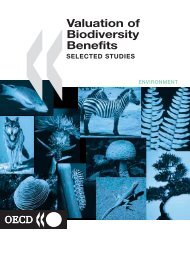Untitled
Untitled
Untitled
- No tags were found...
You also want an ePaper? Increase the reach of your titles
YUMPU automatically turns print PDFs into web optimized ePapers that Google loves.
Division of Translational ResearchMedical GenomicsResearch CenterRESEARCHERSYoung Il Yeom yeomyi@kribb.re.krGenomic analysis of cancers and identification andfunctional validation of therapeutic targetsDong-Su Im imdongsu@kribb.re.krIdentification and validation of target for cancer therapyByoung-Mog Kwon kwonbm@kribb.re.krChemical genomic study using cell- or phenotype-basedassay, gene and protein expression profiling foridentification of the genes and proteins involved in tumorprogression and metastasisYong Sung Kim yongsung@kribb.re.krEpigenomics in gastric and colon cancersEun Young Song eysong@kribb.re.krInvestigation of cancer diagnostic markersSeon-Young Kim kimsy@kribb.re.krFunctional genomics approach to understand humancancersKyung Chan Park kpark@kribb.re.krLarge-scale screening and identification of cancerrelatedgenesCho-Rok Jung crjung@kribb.re.krFunctional analysis of genes associated with cancerBo Kyung Kim kimbk@kribb.re.krStudy of regulation mechanism and validation oftherapeutic target genesDirector Young Il YeomT + 82-42-860-4109F + 82-42-879-8119E yeomyi@kribb.re.krACHIEVEMENTSDevelopment of therapeutic target genes for liver cancerWe analyzed human HCC tissues using a combination of DNA chip and cell chiptechnologies and identified 682 genes showing frequent expression changes in HCC andbearing functional relevance to the development of liver cancer. Currently, we arecollaborating with Pfizer to define therapeutically valid targets for anticancer drugdevelopment for HCC using these omics data.Identification of a novel tumor suppressor gene, POPDC3, in gastric cancerWe found that the promoter region of Popeye domain-containing protein 3 (POPDC3) wasaberrantly methylated in gastric cancer. POPDC3 expression was reduced in 87% ofgastric tumors compared with normal adjacent tissues. Combination treatment with aDNA methylation inhibitor and histone deacetylase inhibitor strongly induced POPDC3expression. POPDC3 were hypermethylated in 64% of gastric cancer tissues. Knockdownof POPDC3 in SNU-216 cells caused increased cell migration and invasion.Development of tools and algorithms for analyzing omics dataA comprehensive gene expression database comprising more than 35,000 human tissuessamples was constructed and it is updated regularly. Also, a gene expression databaseproviding differential expression information after treatment of diverse drugs is beingconstructed. Many potential drug targets and biomarkers were identified by miningthese databases and are being experimentally validated.Identification of roles of PDLIM7 Enigma in tumorigenesisWe found that Enigma directly forms a complex with Mdm2, inhibits Mdm2selfubiquitination and stimulates degradation of p53. Expression of Enigma was inducedby SRF, and co-expression of SRF-Enigma proteins with Mdm2 was detected in cancertissues. Our findings suggest a potential role of Enigma in tumorigenesis, and uncover anovel mechanism to attenuate the function of p53 through the SRF-Enigma-Mdm2pathway.Mi Sun Won misun@kribb.re.krFunctional validation of candidate target genes andbiomarkers for therapeutics/ diagnostics developmentHee Gu Lee hglee@kribbre.krProduction and application of antibodies for functionalanalysis of cancer related genesNam Soon Kim nskim37@kribb.re.krIdentification and functional study of target genes relatedto gastric, liver and colon cancersDong Cho Han dchan@kribb.re.krStudy of cancer cell migration and metastasis usingchemical biologyKyung-Sook Chung kschung@kribb.re.krDevelopment of anticancer drugs by chemical screeningand study of modes of actionJae Wha Kim wjkim@kribb.re.krIsolation and characterization of tumor relatedmoleculesRESEARCH AREASEstablishment of a functional and chemical genomicsresearch infrastructure and technology platformsLarge-scale screening and identification of diseaserelatedgenesFunctional validation of candidate target genes andbiomarkers for therapeutics and diagnosticsdevelopmentDevelopment of tools and strategies for modulatingtherapeutic targets and monitoring biomarkersDevelopment of a diagnostic assay systemProduction and application of antibodies for functionalanalysis of novel genesSELECTED PUBLICATIONSMi Sun Won & Kyung Sook Chung (Co-first) Apoptosis. 15(12):1540-8.JNK-mediated transcriptional upregulation of RhoB is critical for apoptosis of HCT-116colon cancer cells by a novel diarylsulfonylurea derivativeMi Sun Won (Corresponding) Biochem Pharmacol. 80(7):982-9.LW6, a novel HIF-1 inhibitor, promotes proteasomal degradation of HIF-1α viaupregulation of VHL in a colon cancer cell lineYoung Il Yeom (Corresponding) Biomaterials. 31(7):1858-64.Gene delivery using a derivative of the protein transduction domain peptide, K-AntpByoung-Mog Kwon (Co-corresponding) Br J Pharmacol. 159(8):1646-62.Obovatol attenuates microglia-mediated neuroinflammation by modulating redoxregulationYong Sung Kim (Corresponding) Carcinogenesis. 31(9):1685-93.Frequent silencing of popeye domain-containing genes, BVES and POPDC3, is associatedwith promoter hypermethylation in gastric cancerYoung Il Yeom (Corresponding) Gastroenterology. 138(5):1898-908.Functional switching of TGF-beta1 signaling in liver cancer via epigenetic modulation of asingle CpG site in TTP promoterSeon-Young Kim & Yong Sung Kim (Co-corresponding) Hum Mol Genet. 19(18):3672-8.Genome-wide association of serum bilirubin levels in Korean populationOur goal is to establish world-class genomics-based technology platforms and to apply them to biomedical research programs.This will achieve high-throughput identification and global function analysis of the genes associated with diseases mostprevalent in the Korean population, such as stomach and liver cancers. We also conduct functional and chemical genomicsresearch to discover validated targets and biomarkers for the development of effective diagnostics and therapeutics.Dong-Su Im (Corresponding) J Clin Invest. 120(12):4493-506.Enigma negatively regulates p53 through MDM2 and promotes tumor cell survival in miceMi Sun Won (Co-first) Nat Biotechnol. 28(6):617-23.Analysis of a genome-wide set of gene deletions in the fission yeastSchizosaccharomyces pombe30 KRIBB Annual Report 2010KRIBB Annual Report 2010 31












